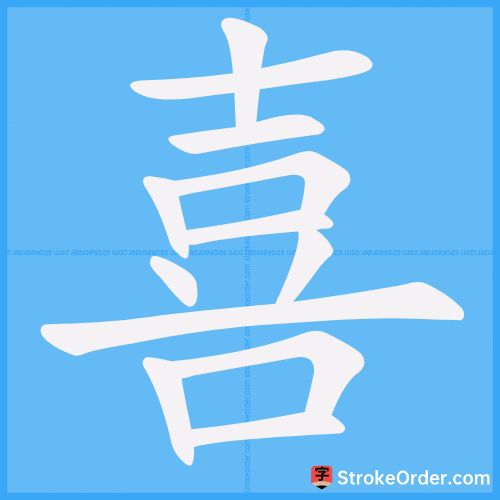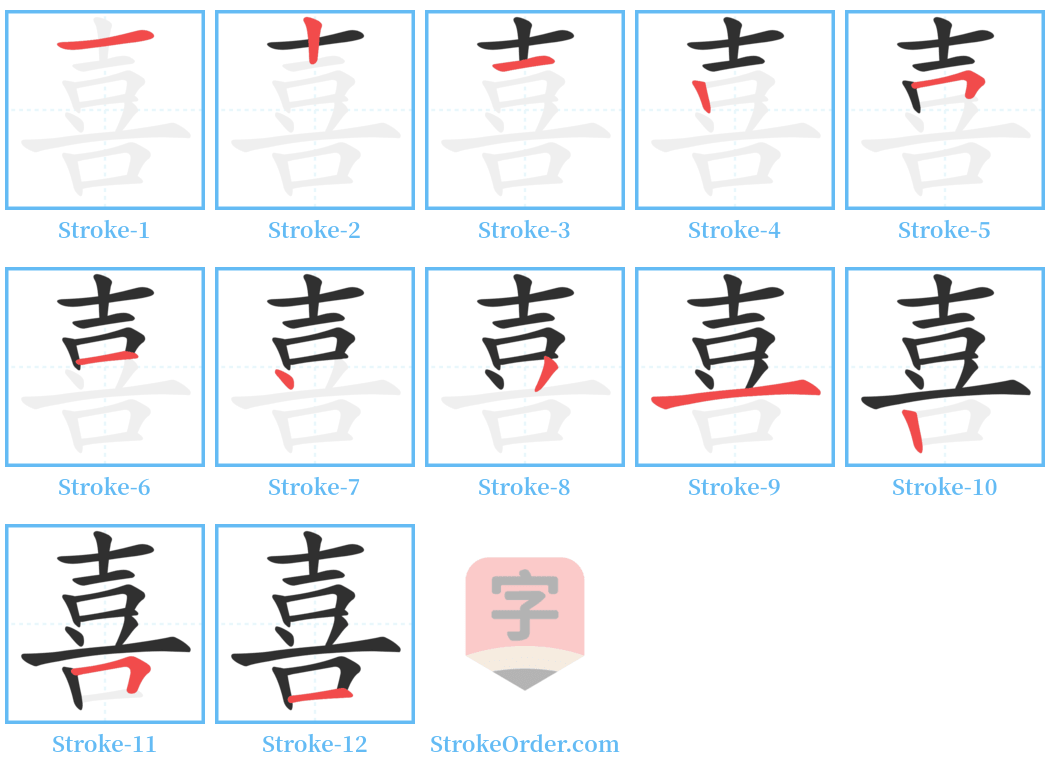喜 Stroke Order
Animated Stroke Order of 喜

Stroke Order Diagrams for 喜

Step-by-Step Handwriting Guide for 喜

Learn to Write Chinese Characters with Video Tutorials
Watch the video of writing the Chinese character "喜", learn the correct stroke order (笔顺) of the character "喜", and master the standard way of writing the character "喜".
Free Printable Handwriting Practice with Stroke Order: 喜
Printable Writing Practice Worksheet of "喜" in Portrait Orientation (Tian Zi Ge)

Printable Writing Practice Worksheet of "喜" in Landscape Orientation (Tian Zi Ge)

Information of 喜
Pinyin
xǐ
Radical
口
Strokes
12 strokes
Usage
★★★★★
Definition
to be fond of / to like / to enjoy / to be happy / to feel pleased / happiness / delight / glad
喜 [xǐ]
Definitions:
1. 高兴,快乐。 - Happy; pleased.
2. 可庆贺的,特指关于结婚的。 - Celebratory; specifically refers to matters related to marriage.
3. 妇女怀孕。 - A woman being pregnant.
4. 爱好。 - Affection; hobby.
5. 适于。 - Suitable for.
6. 姓。 - Surname.
Detailed meanings:
1. 高兴,快乐: 欢~ (happy); ~悦 (delightful); ~讯 (happy news); ~剧 (happy play); ~气 (happy atmosphere); ~色 (happy expression); ~幸 (fortunate); ~乐 (joy); ~洋洋 (elated); 欢天~地 (jubilant); 欣~若狂 (ecstatic).
2. 可庆贺的,特指关于结婚的: ~事 (happy event); ~酒 (wedding banquet); ~糖 (wedding candy); ~蛋 (wedding cake); ~联 (couplet for a wedding); ~幛 (wedding banner); ~雨 (blessing rain); ~报 (good news); ~庆 (celebration); 贺~ (wedding congratulatory message); 报~ (reporting good news).
3. 妇女怀孕: 害~ (to be pregnant); 她有~了 (she is pregnant).
4. 爱好: ~爱 (to love); ~好 (to be fond of); ~欢 (to take pleasure in); 好 (hào 大~功) (to appreciate significant accomplishments; commonly used to describe ostentatious styles).
5. 适于: ~光植物 (plants suitable for sunlight); 海带~荤 (kelp is suitable for meat).
6. 姓: - (a family name).
Character origins:
本义: 快乐;高兴 - Original meaning: Happy; pleased.
造字法: 会意。甲骨文上面是“鼓”本字,下面是“口”。“鼓”表示欢乐,“口”是发出欢声。 - The character is a combination of meaning; the top part in oracle bone script is "鼓" associated with joy, and the bottom is "口" symbolizing sound made in joy.
Synonyms:
1. 同本义: 快乐 (happy); pleased.
2. 容易: Easy.
Representative quotations:
1. 《说文》: 喜,乐也 - "Happy means joy."
2. 《礼记·檀弓》: 人喜则斯陶 - "When people are happy, they find joy."
3. 《素问·五远行大论》: 其志为喜 - "His will is for joy."
4. 《诗·小雅·菁菁》: 既见君子,我心则喜 - "Upon seeing a noble man, my heart rejoices."
5. 《史记·陈涉世家》: 陈胜、吴广喜,念鬼 - "Chen Sheng and Wu Guang were happy, remembering the ghost."
6. 三国魏·邯郸淳《笑林》: 嘿然大喜 - "Suddenly overjoyed."
7. 唐·柳宗元《三戒》: 虎因喜 - "The tiger was happy."
8. 宋·范仲淹《岳阳楼记》: 不以物喜 - "Not pleased by matters."
9. 清·徐珂《清稗类钞·战事类》: 三保亦自喜 - "San Bao is pleased as well."
10. 《二十年目睹之怪现状》: 喜容原好,愁容也好,蓦地间怒容越好 - "A joyful face is nice, a worried face is fine as well, and suddenly an angry face is even better."
Examples:
- 喜洽: Happy and pleasant demeanor.
- 喜之不尽: Endless joy.
- 喜匆匆: A state of excitement.
- 喜上眉梢: Expressing joy on the eyebrows.
More meanings:
1. 喜事: Happy event.
2. 痘疹: Variola (smallpox). Old custom uses "喜" to denote the appearance of smallpox, seeking good fortune.
3. 姓: Surname.
four types of human emotions, namely: happiness 歡喜|欢喜[huan1 xi3], anger 憤怒|愤怒[fen4 nu4], sorrow 悲哀[bei1 ai1] and joy 快樂|快乐[kuai4 le4]
lit. to like the new, and hate the old (idiom); fig. enamored with new people (e.g. new girlfriend), bored with the old
Input Method for 喜
Pinyin
xi3
Wubi
fkuk
Cangjie
grtr
Zhengma
bjuj
Four Corner
40601
Unicode
U+559c
Same Pronunciation Characters